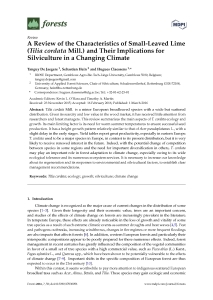De Jaegere T., Hein S., Claessens H.
Tilia cordata Mill. is a minor European broadleaved species with a wide but scattered distribution. Given its scarcity and low value in the wood market, it has received little attention from researchers and forest managers. This review summarizes the main aspects of T. cordata ecology and growth. Its main limiting factor is its need for warm summer temperatures to ensure successful seed production. It has a height growth pattern relatively similar to that of Acer pseudoplatanus L., with a slight delay in the early stages. Yield tables report great productivity, especially in eastern Europe. T. cordata used to be a major species in Europe, in contrast to its present distribution, but it is very likely to receive renewed interest in the future. Indeed, with the potential change of competition between species in some regions and the need for important diversification in others, T. cordata may play an important role in forest adaptation to climate change, especially owing to its wide ecological tolerance and its numerous ecosystem services. It is necessary to increase our knowledge about its regeneration and its responses to environmental and silvicultural factors, to establish clear management recommendations.
Consultez la notice complète de l’article sur ORBi

